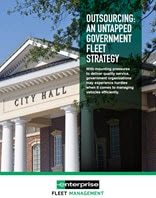OUTSOURCING: AN UNTAPPED GOVERNMENT FLEET STRATEGY
With mounting pressures to deliver quality service, government organizations may experience hurdles when it comes to managing vehicles efficiently.


Government entities, whether a municipality, county, or even a school district, are typically challenged to do more with shrinking budgets. That along with mounting pressures to deliver quality services can cause government organizations to experience hurdles and challenges when it comes to managing fleet vehicles efficiently.
It’s common for an organization to have multiple departments managing vehicles, depending on the department’s use of the vehicles. Due to the silo effect, some institutions may not realize the total number of vehicles they operate makes them eligible for professional fleet management services.
It’s equally as common for organizations to have a fixed annual budget to support expenses for all vehicle program needs. A typical approach to keep costs low is for the organization to buy vehicles outright one at a time and hold them until they are inoperable or until “the wheels fall off.” This self-managed approach is often mistakenly considered more cost effective. In addition, this approach typically leaves organizations with a fleet of aged vehicles, increasing maintenance expenses, extensive vehicle downtime, safety concerns, and no excess budget to replace vehicles.
Outsourcing vehicles to a professional fleet management company (FMC) is a win-win situation for government agencies. An FMC understands the realities of adhering to strict budgets and changing environments, and can create a flexible fleet plan to support the mission of serving a community.
Purchasing a vehicle outright and maintaining it for the duration of its useful life is a belief held by many organizations, public or private, to be a “less expensive” and “sustainable” strategy. Whether this approach is used because “it’s the way things have always been done” or it’s a way to avoid the need to ask for annual funding for new vehicles, the result is the same — an aging, expensive-to- maintain, increasingly unsafe fleet.
The misunderstanding of when and why assets need to be cycled most often comes from oversight committees and boards that have little understanding of total cost of ownership (TCO) factors, particularly related to maintenance. For example, holding a vehicle, particularly a high-use one such as a police cruiser, beyond its recommended useful life could cost a fleet more to maintain than cycling it for a new one every few years. The belief is that once the municipality owns the vehicle, it’s saving money because it no longer is costing the town or city money related to its acquisition, which will cost taxpayers more in the long run.
It’s important to remember that elected officials and board members are often not automotive industry experts.
An organization’s leaders may not have automotive experience, but there may be others who operate the fleet who may have some personal experience self-managing vehicles. Depending on the level of expertise, relying on this experience could impact opportunities to reduce Total Cost of Ownership (TCO) in a proactive way.
Fleet management duties may be supported by an employee who has other responsibilities, such as procurement, which means the employee could be an expert at up-front cost controls, but likely does not have the dedicated resources and automotive background needed for other aspects of effective fleet management - reporting and tracking of vehicle performance or comprehensive TCO analysis.
Personnel focusing on both fleet and non-fleet related job duties — adding to their administrative burden, can often result in missed opportunities to optimize and proactively manage fleet operations.
One of the biggest benefits of outsourcing fleet services is not letting vehicle issues take away from employees’ productivity, and allowing them to focus on their primary jobs. An FMC can reduce the organization’s administrative time spent managing vehicle licensing and titling, maintenance intervals, or other fleet-support functions.
As with their private sector and commercial fleet counterparts, outsourcing can provide public agencies and government entities a number of advantages when it comes to improving fleet efficiencies, including:

Protecting capital budgets: Leasing vehicles through an FMC can lower up-front vehicle acquisition costs, helping budgeted dollars go further.

Lowering operational costs: Newer vehicles reduce maintenance costs and increase productive uptime. Newer vehicles have improved fuel economy, which can help the cost per mile.

Fixed budget: FMCs offer unique financing, such as equity leasing, providing organizations with flexibility to budget for their current and future fleet needs.

Right-sizing: Many organizations have vehicles that are under-utilized and can be surplussed. An FMC can determine which vehicles need to be sold and manage the entire resale process.

Right-typing: Determine the best vehicle for the job and build the vehicle to specifications for its primary function, taking into account the aftermarket equipment and the vehicle’s resale value at the end of term.

Access to incentives: Partnering with an FMC can provide access to volume and government-related purchase incentives to ensure buying at the lowest possible price for the best type of vehicle.

Tracking & Reporting: Analyze the vehicle data, including mileage, fuel expenses, maintenance costs, and use to monitor your fleet performance to stay on top of maintenance and other cost-saving opportunities.

Vehicle Resale & Equity: Leveraging the expertise of an FMC can help governments sell vehicles at the optimal point with a multi-channel approach to maximize resale values, which can be reinvested in the fleet.
The Hendry County (Florida) Sheriff’s Department successfully replaced 21 vehicles in a single year after several years of adding no vehicles. Enterprise Fleet Management worked closely with the sheriff to develop a plan to add upgraded vehicles while reducing costs. Click here to learn how.
Local, hands-on account management with a strategic approach helps government fleets leverage the expertise of Enterprise to save them money. Enterprise Fleet Management provides each client with a dedicated Client Strategy Manager and team to support everything from day-to-day driver needs to helping with identifying the right time to dispose and replace vehicles.
Outsourcing can provide a government’s fleet program with flexibility. By partnering with an FMC, governments will have access to data analytics and expertise to compare vehicle makes, models, and features to support the best fit for their employees and consider the expected resale value. An FMC can also support your organization’s needs to source specialty vehicles, including emergency response vehicles or those with specialized aftermarket upfitting. Outsourcing specialty and emergency response vehicles from an FMC partner can have many of the benefits of outsourcing the management of the white fleet for an organization.
FMC partners can identify cost-effective services to reduce challenges your fleet may currently face. Onboarding a full-service maintenance program would, in most circumstances, increase the number of preferred maintenance and repair shops available to your drivers, enabling vehicles to be serviced closer to their area of operation. A simple update like this can help reduce excessive downtime or non-productive miles commuting to repair facilities. An FMC, like Enterprise Fleet Management, offers maintenance programs to their clients where ASE-certified technicians work on your behalf to validate and negotiate service work on all vehicles, which ultimately works to save organizations hours of time they would have spent doing research.
Many clients who have an in-house maintenance team continue to use their team for emergency vehicles, while outsourcing their white fleet to a network of maintenance providers. Outsourcing white fleet maintenance allows for more efficient in-house operations, as technicians can better focus on the preventative maintenance of large fleet and heavy equipment, as well as providing long-term flexibility in staffing.
FMCs offer solutions to help track operational costs and vehicle utilization in real time. Many agencies may lack resources, technology, or the ability to capture and report this type of information related to their fleet. Fleet management technology can provide transparency to help identify vehicle mileage and utilization patterns, and be able to proactively create a fleet strategy based on data. The data can be used to show savings, but also help spot opportunities to replace vehicles.
When it comes time to consider outsourcing a vehicle management program to a private third party, best practices include an approach that considers operational, financial, and analytical perspective.
Understand how an FMC can benefit your government office and get tips to present a recommendation to outsource the management of your fleet vehicles.
Plan ahead of time.
A case for partnering with an FMC may need to be built with the help of an industry expert over several weeks. Like many government entities that have outsourced the management of their vehicles to an FMC, you may need to deliver presentations overviewing the proposed program benefits.
Provide specific and fleet-related data.
Build your presentation around an analysis of the fleet’s current performance and the total cost of ownership. Include the benefits of an open-end equity lease, any expected manufacturer and government incentives, and improved program efficiencies from cycling vehicles earlier.
Open communication.
Your selected FMC partner will support questions with data, testimonials, and examples throughout the process. Be sure to understand if your FMC works with government clients and ask if they have relationships with professional cooperative partnerships to assist with the entire process from the RFP to the board presentation.
A strong FMC partner will build a custom analysis of the fleet and use it to find opportunities for cost and time savings with a professional fleet management program.

Enterprise Fleet Management provides their clients with an individualized and consultative approach to help them manage their fleet of vehicles. Enterprise Fleet Management’s local Client Strategy Manager and account support team customizes a fleet plan based on the client’s specific needs using their extensive industry knowledge and hands-on experience. Enterprise Fleet Management has helped hundreds of government organizations optimize their fleets by leasing newer, safer vehicles at a fixed cost.
Many of Enterprise’s fleet division employees have experience managing their own fleets of vehicles while working for Enterprise Rent-A-Car’s rental branch operations. Many had to manage and maintain their rental fleet, and strategically work with data and industry trends to know when to replace vehicles while adhering to budgets.
Enterprise Fleet Management offers a support structure that provides peace of mind when outsourcing the management of your fleet vehicles’ acquisition process — including financing. When governments consider outsourcing, they need to know that a partnership with Enterprise can help them buy vehicles at a low price and sell them at a high resale value. This includes designing a fleet program around helping an organization make decisions to operate their fleets within their budgets, reviewing financing and funding structures to fit budgets, which also includes support acquiring new vehicles, keeping consistent maintenance costs, disposing of older vehicles, and mitigating safety risks.
The decision to outsource should leverage an analysis of the fleet’s data and a consultation from an FMC like Enterprise Fleet Management. Having a holistic view, paired with operational and budgetary goals, ability to handle risk, and flexibility are ways to demonstrate the value of outsourcing the management of your vehicle program, but more importantly bring on a sustainable solution to your entire government fleet program.
To learn how Enterprise Fleet Management can help your fleet with its leasing and outsourcing decisions, contact Enterprise Fleet Management at efleets.com or by calling 877-23FLEET.
Owned by the Taylor family of St. Louis, Missouri, Enterprise Fleet Management operates a network of more than 50 fully staffed offices and manages a fleet of more than 630,000 vehicles in the U.S. and Canada. The business provides full service fleet management for companies, government agencies and organizations operating medium-sized fleets of 20 or more vehicles, as well as those seeking an alternative to employee reimbursement programs. Enterprise Fleet Management supplies most makes and models of cars, light- and medium-duty trucks and service vehicles across North America. As one of the largest buyers and sellers of vehicles, Enterprise is the undisputed expert in remarketing
For more information about Enterprise Fleet Management, visit www.efleets.ca.

THANK YOU FOR YOUR INTEREST
Want to learn more? Contact Us for a free Fleet consultation.